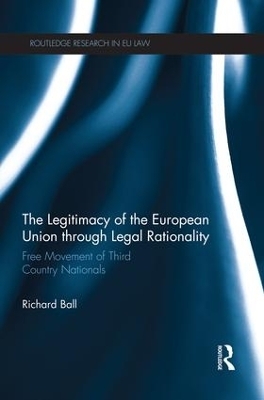
The Legitimacy of The European Union through Legal Rationality
Free Movement of Third Country Nationals
Seiten
2015
Routledge (Verlag)
978-1-138-93520-4 (ISBN)
Routledge (Verlag)
978-1-138-93520-4 (ISBN)
Third country nationals (TCNs) play an important part in the economy of the European Union, reflected in the rights granted to them under European Union Law. Political expediency is however shaped by world, regional and domestic influences that in turn determine policy towards third country nationals and their legal rights to freedom of movement.
This book examines the concept of political legitimacy within the European Union through the principles of legal rationality, focusing in particular on the European Union’s policy towards third country nationals. Richard Ball argues that for legal doctrine to be rational it must display the requirements of formal, instrumental and substantive rationality, each mutually exclusive and essential.
In taking this position of legal rationality, the book focuses on free movement rights of TCNs within EU treaties and implementing legislation, the Area of Freedom Security and Justice, and Association Agreements. Ball concludes that the stance of European Union Law towards third country nationals lacks legitimacy, and suggests possible new directions that EU policy should take in the future.
This book examines the concept of political legitimacy within the European Union through the principles of legal rationality, focusing in particular on the European Union’s policy towards third country nationals. Richard Ball argues that for legal doctrine to be rational it must display the requirements of formal, instrumental and substantive rationality, each mutually exclusive and essential.
In taking this position of legal rationality, the book focuses on free movement rights of TCNs within EU treaties and implementing legislation, the Area of Freedom Security and Justice, and Association Agreements. Ball concludes that the stance of European Union Law towards third country nationals lacks legitimacy, and suggests possible new directions that EU policy should take in the future.
Richard Ball is Senior Lecturer in Law and Head of the Comparative and European Research Unit at the University of West England, UK.
1. Introduction 2. The Theory of Rationality and Objective Justification 3. Free Movement Rights under the Treaties and Implementing Legislation 4. Free Movement Rights Based on the Area of Freedom, Security and Justice 5. Free Movement Rights Based on Association Agreements 6. The Practical Application of Rationality and Objective Justification 7. Conclusions
| Erscheint lt. Verlag | 21.8.2015 |
|---|---|
| Reihe/Serie | Routledge Research in EU Law |
| Verlagsort | London |
| Sprache | englisch |
| Maße | 156 x 234 mm |
| Gewicht | 521 g |
| Themenwelt | Recht / Steuern ► Allgemeines / Lexika |
| Recht / Steuern ► EU / Internationales Recht | |
| Recht / Steuern ► Öffentliches Recht ► Völkerrecht | |
| Sozialwissenschaften ► Politik / Verwaltung | |
| ISBN-10 | 1-138-93520-4 / 1138935204 |
| ISBN-13 | 978-1-138-93520-4 / 9781138935204 |
| Zustand | Neuware |
| Haben Sie eine Frage zum Produkt? |
Mehr entdecken
aus dem Bereich
aus dem Bereich


